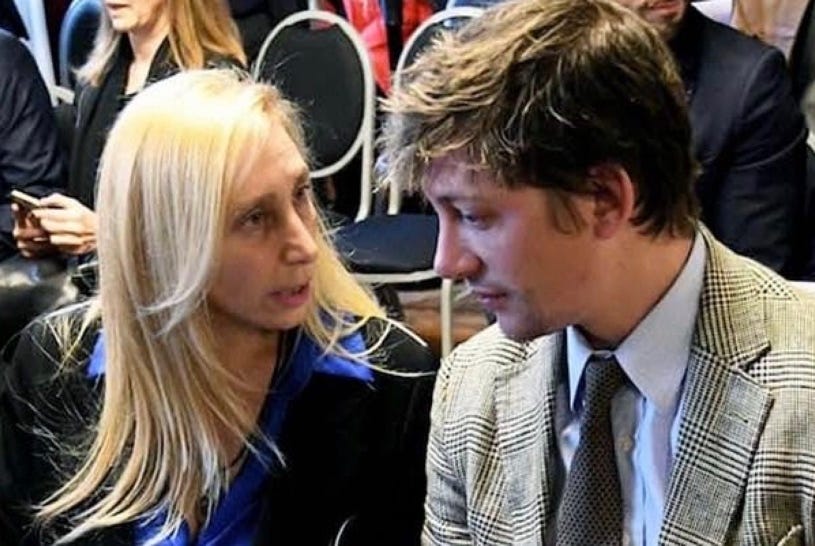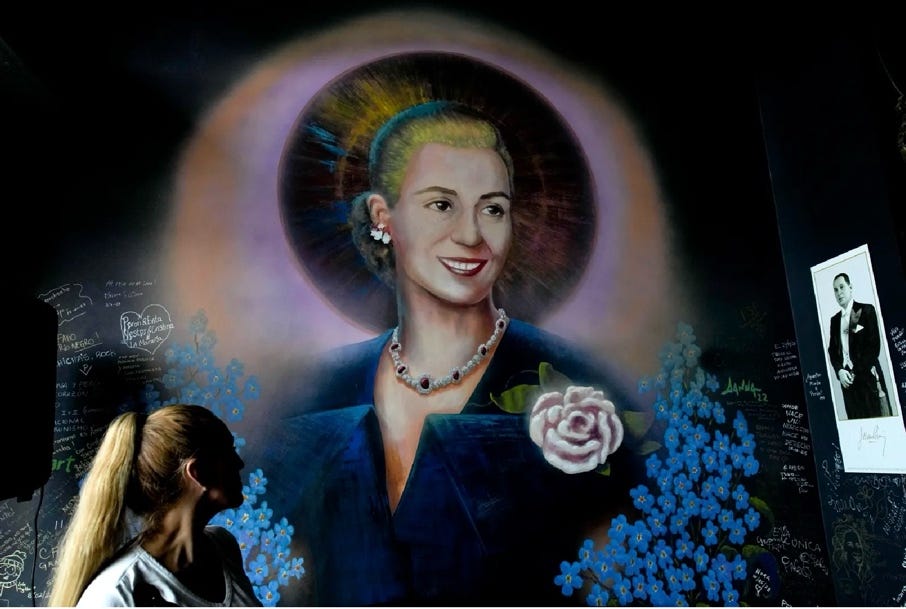What Works to Stop a Dictator: Global Lessons for America. Argentina (Intro).
For bad boy libertarian leader Javier Milei, image is everything -- and is rooted in a childhood marked by abuse. He channels God and his dead dog Conan to guide him as Argentina's great disruptor.
Javier Milei, a far right populist and leader of the La Libertad Avanza (Liberty Advances) party was elected in 2023 on a promise to halt the country’s runaway inflation.
Photo: Matias Baglietto | Reuters
Note: This introduction is the first of a series of spotlight portraits and resistance conversations with activists and journalists in Argentina.
Lesson One: Image Is Everything
I’ll admit that Buenos Aires hadn’t been on my go-to travel schedule before Javier Milei won the presidency after running as a flamboyant libertarian with a wild sixtiesish hairdo that always makes me think of Mike Meyers in Austin Powers. I’m not saying this to amuse you or make fun of him, though it amused me. And hey – we have to laugh at dictators, too; it brings them down to human size, and that is a known tactic of resistance. I mention it because Milei’s image-making, and his penchant for drama and anti-PCness while thumbing his nose at the establishment, are elements of a bad-boy persona that made him popular with a swath of Argentines back in 2023, especially disaffected young men who loved his takedowns of Argentina’s political elite.
Never mind that Milei is wholly a part of Argentina’s elite, and backed by a clan of oligarchs and billionaires like the Silicon Valley tech bros who’ve flocked to Trump. It’s all about profits to be made for them, too – and power. But Milei’s black leather jacket and Austin Powers hair and tough-guy rhetoric are what sold him to scores of Argentines. Theirs is and was a “fuck you” vote to Argentina’s political class and state system similar to MAGA’s for Trump – a hearty embrace of the politics of grievance, incivility, and let’s break things.
Before I tell you more about Milei, I’ll admit to you that I also wanted to go to Argentina because I sought a break from the US and the onslaught of Trumpism, and because I’ve been interested in the dimly lit tango bars in Buenos Aires since I saw my favorite movie, Happy Together, by Wong Kar Wai. It’s a ridiculously sexy, moody, romantic gay breakup love story played by two established straight actors. We need to balance the seriousness of looming dictatorship with things that lift our spirits and ground them. The movie features an amazing soundtrack of tango, including the sublime, mournful compositions of the great bandoneon player Astor Piazzola. He’s been on rotation on my Spotify for a few years. Swoony music, as I think of it. It put me in a reflective mood, with my eye on history, as I flew to Buenos Aires to see how Argentines were fighting Milei. (I’ve decided to include the soundtracks to my research trips, so you can appreciate the ambience.)
I don’t want to give you a deep bio here about the playboy dictator, as some call him; you can read about Milei on Wikipedia to see the basic information that a global public is being told about Argentina’s 59th president. I got stopped by his hair and long sideburns, which are distracting, and his biker jacket, which is designed to distinguish him from the bulk of Argentine political leaders who favor sensible, if boring, suits. Even before I arrived in BA, as expats prefer to call the capital, I’d seen a bunch of pictures of Milei wearing his leather, looking like an outlaw to his fans, holding up a chainsaw in campaign press pictures, ready to “cut through” government bureaucracy and waste. He ran on a promise to impose a radical austerity program, and espoused an anti-woke, anti-woman, pro-family-values conservative Catholic social agenda. He’s also gone after immigrants and the poor.
Like Orbán and Trump, he's embraced a full war on gender. He’s demonized and moved to criminalize LGBTQIA+ people, labeling transgender people as pedophiles and a threat to Argentine youth. His signature chainsaw signaled his plan to rule with brute force and use threats and violence against political critics. He has followed up on that.
Milei lifts a chainsaw during Buenos Aires political rally, September 25, 2023.
Photo: Tomas Cuesta | Getty Images
With moves like Jagger....
After I arrived in Argentina, new friends I made were always quick to ask whether I’d seen Milei in his rebel black leather get up. They asked this with a look that conveyed sarcasm, amusement, and a bit of bitterness, because they know that a big part of Milei’s appeal continues to be his manufactured image as a strongman, a rule-breaker, a new kind of politician who isn’t afraid to go rogue and take down his enemies. Milei used to be the lead singer in a Rolling Stones cover band called Everest and loves music. That’s also endeared him to youth. That’s the first lesson I picked up on arrival: Milei has spent a lot of time on his image, and he uses social media and an aggressive communications strategy to successfully reach youth and cultivate right-wing influencers, who helped push him to victory. He’s a former television pundit, and has clearly invested heavily in the third ingredient in the Orbán pie of illiberalism: take control of the media and the message.
The classic dictator profile: the bullied child
While I’d read that Milei had suffered a rough childhood, I hadn’t appreciated how awful until I began digging down. It’s an extreme version of the classic story of being bullied we know about that also applies to Trump and Viktor Orbán -- the abused kid who toughens up to survive and becomes the adult bully. It softened my heart to Milei, and what he endured, though not to what’s he’s become and done to others in response. But it helps explain his hardline image, and embrace of chainsaws and violent threats, and his often highly personal attacks and slurs directed at political rivals and journalists and – this is also notable, like Trump – people he perceives as weak or vulnerable.
That can extend to people with disabilities and children: both Milei and Trump share that sad trait. Also, how Milei has attracted his loyal base of acolytes and angry young men, who embrace his version of the MAGA dream — Make Argentina Great Again — by instilling fear, by breaking norms, by seeking violent retribution. Milei is modeling what happened at home, and at school, too, the bullied child who becomes ultra-sensitive to slights, who builds a protective shell, but is shattered and vulnerable internally, with a super-fragile ego. Again, this template also applies to Trump, with a Nazi-loving father, and to Orbán, whose violent father reportedly beat him once or twice a year until he was 17. The psychological portrait of dictators as the bully-as-bullied children is well known. They do what they learned at home.
There, Milei lived with his sister and mother in their family home in Villa Devoto with his bus driver father, Norberto, which has been described as a living hell. Norberto boasted about traveling with a truncheon by his seat to use against difficult passengers, and would savagely beat his son, and humiliated him constantly. “You’re rubbish; you’ll never amount to anything,” was the paternal message. The details of his home life come from Juan Luis Gonzales, an intrepid and now-famous Argentine journalist and writer I interviewed n BA who has covered Milei’s rise like a dog on a bone. He penned a first political biography, El Loco (The Crazy One), subtitled (in English), The unknown life of Javier Milei and his irruption into Argentine politics. Another Milei-themed book is Las Fuerzas del Cielo, The Forces of Heaven, it focuses on Milei’s belated mysticism and belief that God chose him for the country’s top job.
I had to look up the word, irrupcion, thinking it was simply translated as interruption or maybe disruption, but the word carries a level of violence: a violent or forceful incursion into Argentina’s political life, then. That describes Milei’s survival instincts and cultivated image: a violent disruptor.
Gonzales presents a telling anecdote that, as he puts it, captures Milei’s family life perfectly. In 1982, when Milei was 12, he was watching the announcement of the Malvinas War on television and remarked out loud that “it would probably turn out badly for Argentina, with all the certainty of a 12-year-old,” wrote Gonzales. “Norberto is said to have exploded into a kind of patriotic rage and beat his son all over the house. Karina, his sister, two years his junior, suffered such a terrible shock that she ended up in hospital.” That’s not all. The capper is his mother’s response. From the hospital, she called her beaten son who’d been left alone at home, and laid into him: “Your sister is going to die, Javier. And it’s your fault.” The lack of family sympathy extended to school, where Milei was reportedly a lonely kid, with no friends, soon nicknamed El Loco (the crazy one) and constantly bullied. Gonzales isn’t the first journo to note Milei’s “instability” and hair-trigger sensitive temper. “Was Milei’s instability born from this complex childhood? Or did it come later?” asks Gonzales.
I’d say the apple doesn’t fall far from the tree. There are other aspects to the Milei bio that are rich, and have also made him the target of mockery that might also be linked to his abused inner child psyche. Argentine critics have gleefully recounted how Milei has relied on the political advice of his “dogs/sons” that he truest more than humans, he told his Argentine compatriots — first a beloved mastiff named Conan, then the five clones of Conan he ordered from a US company in 2017 after his beloved pet died. Conan’s death spurred Milei to embark on a spiritual journey into mysticism: it’s also when he claims he received word from God that he was chosen for a “mission” to save Argentina from “evil.”
I’m not sure what it means that one of the clones later bit Milei, putting him in the hospital with stitches. One assumes he somehow failed to follow his pet’s advice. While all this might be viewed as comical, if not sad, the grim reality is that Milei’s imposed such nonsense on the Argentine public and let it guide his policies. And let’s also note that his sister and close advisor Karina, is hardly a shrinking violet, either. She clearly suffered from living with a nightmare father, and it toughened her up too. The rough-and-tumble of Argentine politics had noting on Norberto pere.
Milei’s dynamic duo of advisors includes sister Karina Milei and strategist Santiago Caputo
Photo: CEDOC/PERFIL
Karina has greatly helped her big brother shape his public image, ably managing his presidential campaign. So has Santiago Caputo, age 39, a close friend who’s another tough guy. The three are referred to as the “Iron Triangle” of Argentine politics. Caputo is viewed as Milei’s secret weapon and top strategist, an establishment outsider and another disrupter some compare to Steve Bannon in the US. Caputo reportedly oversees the intelligence forces, SIDE, and Milei’s program on immigration, privatization, and anti-money laundering — key elements of Milei’s “shock doctrine” platform. An enforcer, it seemed. He’d escaped my radar up to then.
Like Milei, Caputo projects a bad-boy image, a youthful cool cat who smokes, sports Ray-Bans, and has Russian-style tattoos on his arms that peek out from the rolled-up sleeves of his signature button- down white or blue work shirts. He’s a kind of It Boy of the Argentine alt-right, a role model for Milei’s base of angry young men.
Milei with his trust advisors and "children with four paws."
Photo: Novinite.com
Milei was already a known contrarian face to his countrymen before he sought the highest office. He is a free-market economist who served as national deputy representing the capital, Buenos Aires, for the far-right libertarian La Libertad Avanza (Liberty Advances) party from 2021 until he resigned in 2023. He was also a popular pundit on television, which is where he built his pugnacious image. Argentines who voted for him hoped his pro-market policies and pledge to cut government spending would put a brake on runaway inflation. He was elected on that overriding issue: the economy. He won because he represented the anti-vote – the opposite of what had come before, which is known as Kirchnerism, the longtime political movement that was formed by supporters of the former leftist populist presidents of Argentina, Nestor Kirchner and his wife, Cristina Fernandez de Kirchner, who succeeded him.
Many blame Cristina’s economic policies, marked by unbridled state spending and social assistance programs to the poor, for the sky-high inflation that resulted. She was succeeded by Peronist Alberto Fernandez, who inherited a tanking economy. Fernandez also badly hurt the Peronist brand by revealing himself as a violent macho who was accused of repeated domestic violence by a former partner, a scandal that shook his party and helped pave the way for an anti-Peronist. It gave Milei fodder to go after Fernandez’s signature policies, including support for transgender inclusion and job equity.
As with Orbán in Hungary, the economy remains the real litmus test of his popularity. Inflation has fallen from a triple digit peak in late 2023 to double digits – a definite improvement but still way too high for voters. I’m jumping ahead here to give you a little forecast preview of the possible future, because in early September, Milei and his party suffered a real setback in provincial elections – the first electoral test of his staying power. His Freedom Advances party only got about 34% of the vote in Buenos Aires province, where half the people in the country live, compared to 47% for the Peronist candidates. As the peso and Argentine markets dropped further, public support for his austerity program has fallen.
A mural of Santa Evita, María Eva Duarte de Perón, adorning the wall of the Peron Peron restaurant in the San Telmo neighborhood of Buenos Aires.
Photo: Natacha Pisarenko | AP
Lesson Two: Politics As Religion
In Argentina, people often adopt a familial, fandom relationship with political and other leaders, who are referred to by their first names or nicknames. Kirchnerism is an offshoot of Peronism – à la Juan Domingo Perón, a three-time president of Argentina, and Eva Perón, his second wife. The former First Lady is revered as Santa Evita, a saint of the people, though not officially canonized by the Vatican. Eva Perón remains a cultural and spiritual icon, a political symbol of compassion for the poor, linked to a class-based politics of social justice and equality. Today, leftist populist Peronism reflects the main opposition to Milei.
During my time in Buenos Aires, almost everyone I met identified as a Peronist, regardless of any other political label. They had a fervent attachment to Peronism; some identify both as Peronists and Kirchnerists. Many still pray to Santa Evita in this heavily Catholic country; she is the patron saint of unions and workers.
That was a second flash lesson I learned: that many Argentines love, and seek out, strong and charismatic figures like Eva Perón. Peronism, like Kirchnerism, goes beyond a political affiliation. It’s religion, and calls upon supporters to invest faith, an emotional bond that’s inseparable from national identity. To be Argentinian is to love Eva Perón and what she stood for, including her love and championing of the poorest and indigenous rural people. There is a cult of personality that gets built up around political leaders and cultural figures; Milei clearly understands that. That’s why he also reinvented himself as a pious man of God, which critics view as a calculated political embrace of Catholicism and conservative family values.
That follows the playbook of what Orbán did in Hungary, what Putin has done in Russia, and now, what Trump has done, too. In Argentina, Christian evangelicals are a major political force that Milei has successfully courted. They use their congregations to help get out the vote. Like Trump, Milei has gone so far as to say he was chosen by God to lead Argentina.
Many Argentines feel almost as passionately about Cristina as they do Santa Evita. I got a close-up look at this the first week I was there, which happened to be the week when Cristina was finally sentenced by the highest court on charges of corruption, following a protracted judicial process. She’s now condemned to a six-year house imprisonment and can never run for political office again. A massive protest rally for Cristina filled the streets of Buenos Aires and was covered like a major political event, which it was. To her supporters, it was another knife in the heart of Peronism – a move to prevent Milei’s biggest rival from running again to oust him.
Cristina Kirchner (left) and Eva Perón (right), Argentina’s worshipped female political leaders
Building Devoción
The sight of throngs of Argentines clamoring for Cristina and Santa Evita also illustrates why Milei has to work so hard to cultivate his brash holy warrior-with-a-chainsaw image. He’s up against Santa Evita, and now Cristina, her successor, who’s deemed a political prisoner and modern martyr by a new generation of Peronists. She’s promised to rally her country to fight Milei and free Argentina’s democracy from the fascists. As national stories go, hers fuses a devoted public, ambition, tragedy, and scandal – a political melodrama worthy of a great tango soundtrack. It also helps explain why the Peronist party may be gaining popularity again while Milei’s star is falling. It’s too early to predict the outcome, but one truth shines: image is huge in Argentine politics; so is one’s story. The more larger-than-life, the better with voters. In this largely Catholic country, politics remains a matter of devoción. Faith is a critical ingredient. It matters who you pray to for salvation.
To readers:
I welcome your feedback on this series. Please help me share this content by restacking, and sharing links on your other social media platforms or to your networks. Together, we can elevate the messages of What Works to Stop a Dictator.












Seeing the same ridiculous authoritarian playbook work over and over across the world, is just exhausting.
Great article and the parallels between Milei, Trump and other Authoritarian dictators are very interesting. Seems like they all read the same playbook.